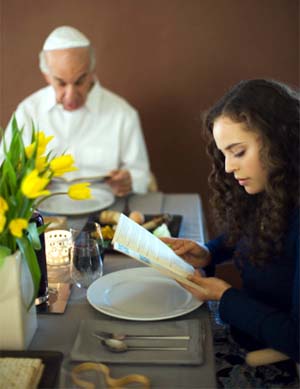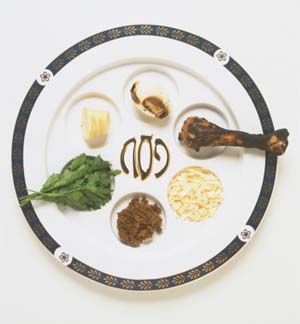Feb 13, 2026
Feb 13, 2026
 Passover, as the Jewish festival Pesach is popularly known, begins on the 15th day of the Jewish month of Nissan, the start of the spring season. It has both historical and agricultural significance. Agriculturally, it represents the commencement of harvest in Israel. However, the primary observances of Passover are related to the Jewish Exodus from Egypt, and consequent redemption from slavery. The various rituals and observances associated with Pesach help us to understand this crucial narrative of collective Jewish memory.
Passover, as the Jewish festival Pesach is popularly known, begins on the 15th day of the Jewish month of Nissan, the start of the spring season. It has both historical and agricultural significance. Agriculturally, it represents the commencement of harvest in Israel. However, the primary observances of Passover are related to the Jewish Exodus from Egypt, and consequent redemption from slavery. The various rituals and observances associated with Pesach help us to understand this crucial narrative of collective Jewish memory.
The term 'Passover' refers to the fact that God instructed the Great Plague to 'pass over' the houses of the Jewish people, while afflicting all the firstborn of Egypt, as a punishment to the Pharaoh. The festival is also referred to as Chag he-Aviv (the Spring Festival) or Zeman Herutenu (the Time of Our Freedom). The Passover lasts for seven days (eight days outside of Israel). No work is permitted on the first and last days of the holiday (first two and last two days outside Israel).
The most significant observance related to Passover involves the removal of chametz (leavened bread/food) from Jewish homes. This commemorates the fact that the Jews leaving Egypt were in a hurry, and did not have time to let their bread rise. It also symbolizes the act of 'cleansing the soul' of arrogance and pride. The grain product eaten during Passover is called matzoh ' the unleavened bread made from flour and water and cooked very quickly so that the dough does not rise. The matzoh is a symbol of the hardships of exile and the speed of redemption.
 The day before the Passover is the fast of the firstborn, commemorating the fact that the firstborn Jewish males in Egypt were not killed during the final plague. On the first night of Passover (first two nights for traditional Jews outside Israel), a special family meal called seder, interspersed with rituals, is held to remind the Jewish people of the significance of the festival.
The day before the Passover is the fast of the firstborn, commemorating the fact that the firstborn Jewish males in Egypt were not killed during the final plague. On the first night of Passover (first two nights for traditional Jews outside Israel), a special family meal called seder, interspersed with rituals, is held to remind the Jewish people of the significance of the festival.
The entire seder ceremony is allegorical. The Jews drink four cups of wine to represent four Biblical expressions of redemption. They eat bitter herbs to remind themselves of their harsh days of slavery. They also eat other symbolic foods that portray their Egyptian bondage ' salt water to remember tears, and charoses, a mixture of apples, nuts and wine that looks like mortar, as a reminder of their hardships in Egypt.
For the Jewish people, Passover is not just an event in history, dead and buried; its significance lies in its timelessness. Jewish Exodus from Egypt is considered the paradigm for 'redemption'. The Russian Jews often refer to their immigration to Israel in recent years as Exodus. Denied of their Jewish roots by the hostile government of the former Soviet Union, Israel for them once again represents freedom from persecution and degradation. Similarly, as the Ethiopian Jews' struggle to build a new life in Israel, their yearning for the Promised Land and God's promise of freedom and dignity seem to have been fulfilled.
Passover also reminds us that freedom is the basis of dignified existence; redemption is God's promise to all people. Each year the Jewish family gathers on this occasion to relive the Exodus from Egypt, spiritually. The Jewish people also remind themselves that freedom is an universal aspiration and to deny this to any people would be incur God's wrath, as the pharaoh did when he enslaved them.
01-May-2005
More by : Sujata Ashwarya Cheema